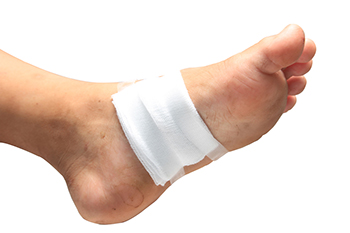
Non-diabetic foot ulcers are open sores or wounds that occur on the feet of individuals who do not have diabetes. While less common than diabetic foot ulcers, they still pose significant health risks. These ulcers can develop due to things like poor circulation, trauma, pressure, or infections. People at risk include those with peripheral artery disease, venous insufficiency, neuropathy, or autoimmune conditions. Additionally, lifestyle factors like smoking, obesity, and a sedentary lifestyle can increase the risk. Non-diabetic foot ulcers often manifest as painful lesions, typically on the bottom of the foot or toes. They require prompt medical attention to prevent complications such as infection or tissue damage. Treatment may involve wound care, infection management, pressure relief, and addressing underlying conditions contributing to ulcer formation. If you have sores on your feet that won't heal, it is strongly suggested that you schedule an appointment with a podiatrist as quickly as possible for a comprehensive treatment plan.
Wound care is an important part in dealing with diabetes. If you have diabetes and a foot wound or would like more information about wound care for diabetics, consult with one of our podiatrists from Montgomery Foot Care Specialists. our doctors will assess your condition and provide you with quality foot and ankle treatment.
What Is Wound Care?
Wound care is the practice of taking proper care of a wound. This can range from the smallest to the largest of wounds. While everyone can benefit from proper wound care, it is much more important for diabetics. Diabetics often suffer from poor blood circulation which causes wounds to heal much slower than they would in a non-diabetic.
What Is the Importance of Wound Care?
While it may not seem apparent with small ulcers on the foot, for diabetics, any size ulcer can become infected. Diabetics often also suffer from neuropathy, or nerve loss. This means they might not even feel when they have an ulcer on their foot. If the wound becomes severely infected, amputation may be necessary. Therefore, it is of the upmost importance to properly care for any and all foot wounds.
How to Care for Wounds
The best way to care for foot wounds is to prevent them. For diabetics, this means daily inspections of the feet for any signs of abnormalities or ulcers. It is also recommended to see a podiatrist several times a year for a foot inspection. If you do have an ulcer, run the wound under water to clear dirt from the wound; then apply antibiotic ointment to the wound and cover with a bandage. Bandages should be changed daily and keeping pressure off the wound is smart. It is advised to see a podiatrist, who can keep an eye on it.
If you have any questions, please feel free to contact our office located in Montgomery, AL . We offer the newest diagnostic and treatment technologies for all your foot care needs.
